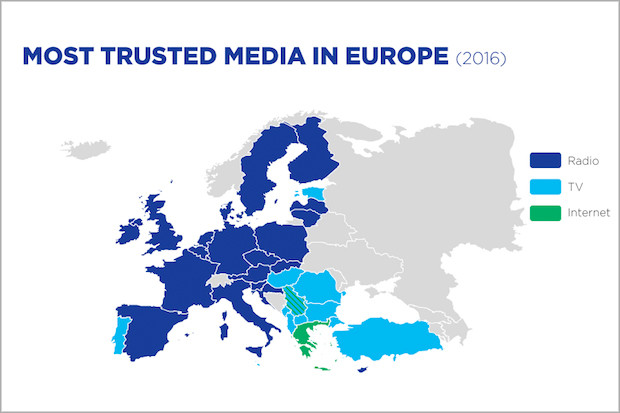The declining trust of audiences in the media has become a concern across the industry, from legacy print outlets and broadcasters to digital news organisations and social platforms.
But according to a new study from the European Broadcasting Union (EBU), some mediums have been affected more than others. Throughout Europe, news consumers trust radio and TV most, while social networks and the written press are at the bottom of the scale.
'Trust in Media 2017', published yesterday, is based on data published in the 86th Eurobarometer, a bi-annual public-opinion survey from the European Commission.
The results are based on some 1,000 face-to-face interviews in 33 countries about people's perception of trustworthiness in different media channels. They survey findings can be accessed by creating a free account on the EBU website.
Radio is the most trusted medium, relied on by 59 per cent of citizens in the European Union, followed by TV, which 50 per cent of EU news consumers said they tend to trust.
Roberto Suarez Candel, head of EBU’s Media Intelligence Service, who led the Trust in Media survey, said the purpose of the report is to visualise the data collected by the Eurobarometer and show the connection between how people consume public media news and their level of trust in it.
The survey did not ask people about their trust in specific news brands, focusing instead on the type of media channels used by audiences.
"If you look at the relationship people have had with radio and TV throughout time, it's a longer and stronger, so they are more able to recognise news brands they trusted before online. We think it's very much about the perception people have of the platform."

Using the Net Trust Index as a benchmark, the report also highlighted that trust in broadcast has increased across Europe in the last five years. The Net Trust Index, developed by the EBU Media Intelligence Service, is the difference between the percentage of the population who answered 'tend to trust' and those who answered 'tend not to trust' in the survey, not counting people who answered 'do not know'.
At the same time, trust in new media (online and social networks) has diminished – social platforms were the least trusted source in 17 out of 33 countries, mostly in Western Europe. The written press only benefits from readers' trust in 13 countries of the total, and people are mostly weary of this medium in Eastern European countries.
News consumers in the UK also said they tend not to trust print publications. Suarez Candel pointed out the level of UK trust in the written press, measuring -51 on the Net Trust Index, has actually improved compared to previous years. However, its consistently low score can be owed to events such as the phone hacking scandal and the fact that tabloid journalism still has a relatively strong presence in the country.
In breaking news scenarios, audiences tend to use social media platforms to get unfiltered eyewitness accounts, but this is also where hoaxes and misinformation can creep in. Suarez Candel said there is a perception of "I don't trust everything [on this platform], but I can trust the social media reporting of a news brand that I already consider of reference" to help filter through the noise.

"Our explanation is social networks and the internet are very good platforms to activate the news, to say that something has happened.
"But the more time passes, the quality of the information on those platforms becomes worse, news gets distorted...so many people then jump to other platforms they associate more with quality journalism."
Some news organisations have started taking steps to improve their audiences' trust. For example, Reuters launched an initiative called Backstory, to help readers understand what goes into the reporting process, while investigative outlet ProPublica is using social media to provide context on issues that are in the news in an informal way, linking to its own reporting and to stories from others.
EBU's report also breaks down trust in media by geographical area. For example, audiences in the Nordics tend to trust TV, radio and newspapers. The written press is also trusted by news consumers in Portugal and the Benelux area (Belgium, The Netherlands and Luxembourg), while Eastern Europeans showed a higher level of trust in online media and social platforms.
Those in Southeast Europe who participated in the survey tend not to trust broadcast reporting and newspapers, while Northwestern Europeans are skeptical of social media and the internet.
EBU's 'Trust in Media 2017' report is available here.
Free daily newsletter
If you like our news and feature articles, you can sign up to receive our free daily (Mon-Fri) email newsletter (mobile friendly).
Related articles
- Schibsted gives young audiences what they want: transparency on editorial decisions
- How journalists can start creating a personal brand online
- 16 free sources of data on the media industry
- 15 tips for cleaning up your LinkedIn profile
- Latest RISJ report: Seven opportunities for your newsroom in 2025












